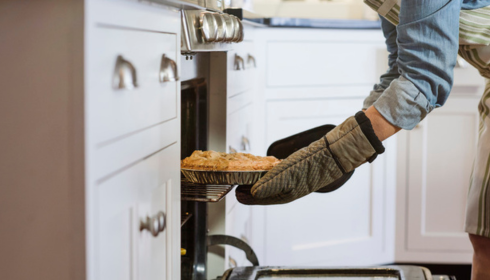There’s nothing quite like the excitement of unboxing a brand-new kitchen appliance. That shiny oven sitting in your kitchen feels like a symbol of fresh beginnings — maybe more home-cooked meals, maybe fewer takeout nights. But then you switch it on for the first time and… wait, what’s that smell? A harsh, chemical odor fills the room, and suddenly your excitement turns into worry.
You might start wondering if something’s wrong — if it’s safe to cook food in there. Or maybe you’re asking yourself whether that strange scent will ever go away. The truth is, you’re not alone. Nearly everyone who’s bought a new oven has noticed it giving off some kind of odd smell during the first few uses. The trick is knowing what’s normal and what might need attention.
The “New Oven” Effect
Most people don’t realize this, but ovens go through something called a “burn-in” phase. When manufacturers build them, they coat the metal interiors and heating elements with oils and protective chemicals. These coatings are meant to prevent rust and damage during storage and shipping.
So when you turn on your oven for the first time, those residues start to burn off. The result? That unmistakable chemical smell from oven that can make your kitchen feel like a mini chemistry lab. It’s unpleasant, sure, but in most cases, it’s completely harmless — just temporary fumes burning away.
Why It Smells So Strong
If your new oven smells weird, it might actually be more noticeable because of modern manufacturing materials. Many ovens today use advanced insulation and non-stick coatings inside the cavity, which can release faint odors when heated for the first time. Add to that the possibility of dust, packaging residue, or even traces of adhesive from the factory — and suddenly it’s a recipe for a strange smell.
Electric ovens tend to emit stronger odors than gas ones because of their heating element design. The smell might linger for a few uses, but it should gradually fade as you continue baking or roasting. Still, the first experience can be quite off-putting — especially if you weren’t expecting it.
What You Can Do About It
The best thing to do before cooking your first meal is to “burn in” your oven. Here’s a simple routine that most manufacturers recommend:
- Remove all packaging — including plastic, zip ties, and manuals (you’d be surprised how many people forget that part).
- Clean the interior with a damp cloth to wipe away any dust or debris.
- Preheat the oven to around 400°F (200°C).
- Let it run empty for 30 to 60 minutes, with the windows open or a fan running.
- Once it cools, wipe it down again.
This process helps get rid of any residual oils or coatings. Sometimes you might need to repeat the cycle once or twice more, especially if the smell is persistent. It’s basically like letting the oven “break in” — the same way you’d break in a new pair of shoes.
When the Smell Isn’t Normal
While a mild odor is expected during the first few uses, a strong, ongoing, or smoky smell could be a red flag. If you find yourself constantly thinking, “Why does my new oven smell so bad every time I use it?”, it might be worth checking a few things.
First, make sure there’s no leftover packaging hidden behind panels or vents — sometimes a bit of plastic or tape can get trapped in weird spots during installation. Next, check the oven cavity for spilled oils or protective coatings that weren’t fully burned off. If you smell gas or see smoke, turn it off immediately and contact the manufacturer or a technician.
Also, if the odor is accompanied by an odd taste in your food or visible smoke inside the cavity, don’t ignore it. Persistent burning smells can indicate a wiring issue, chemical residue, or even an internal fault that needs professional inspection.
Simple Tricks to Speed Up the Burn-In
You can make the smell disappear faster with a few simple hacks. One old kitchen trick is to place a small oven-safe dish filled with water and a few tablespoons of vinegar on a rack, then heat it up for about 20 minutes. The steam helps neutralize odors and loosen any lingering residue.
Another option? Bake something simple but absorbent — like a tray of salt or a few slices of bread — during the early cycles. These can help soak up residual smells while giving you peace of mind that your oven’s not releasing anything harmful.
Safety Comes First
While it’s tempting to just start cooking right away, it’s better to get through that initial smell phase first. Even if it’s not toxic, the burnt chemical odor can cling to food and make it taste “off.” Give your oven a proper trial run or two before trusting it with your favorite dish.
If the smell returns after weeks or months of use, then something else might be at play. Maybe grease or food residue is burning off, or your oven’s self-cleaning cycle left behind some carbonized remains. A quick manual cleaning or using baking soda paste can help freshen things up.
The Smell Will Pass
The good news is: the weird, chemical odor doesn’t last forever. Most ovens lose it completely after two or three uses. Once the coatings have fully cured, the air clears, and your kitchen starts smelling like what it should — food, not fumes.
And honestly, once you’ve cooked your first proper meal — maybe some garlic-roasted vegetables or a pan of brownies — that early chemical scent will feel like a distant memory.
So don’t panic when your new appliance smells funny. It’s just part of the adjustment period, much like that “new car smell” everyone talks about. Just make sure to ventilate your space, give it a proper burn-in, and keep an eye out for anything unusual.
Because once that phase passes, you’ll have an oven that’s clean, efficient, and ready to help you make something truly delicious — without any mystery odors lingering in the air.

